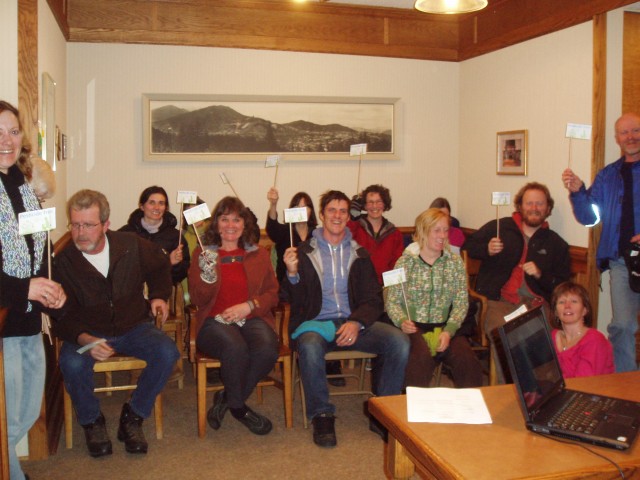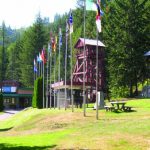Second time's a charm for pesticide ban bylaw
The City of Rossland took a big step this week towards becoming a pesticide-free community. The issue of developing a pesticide-banning bylaw came before council for the second time in the past seven months, this time in a motion from Councillor Kathy Moore. Whereas last time the motion fell in a deadlocked council, the results this time drew a rousing round of applause from the packed council chambers with twenty two people squeezing into the tight quarters.
The motion brought forward was for city staff be directed to draft a bylaw banning the use of cosmetic pesticides in Rossland on public and private lands. Further, the motion asked that the bylaw be modeled on the bylaw adopted by the District of Invermere in the Spring of 2009.
Opening the discussion in speaking to her own motion, Moore was succinct, noting that “When the UBCM (Union of British Columbia Municipalities) discussed the issue two years ago there was an animated discussion whether to endorse this kind of resolution or not. At the 2010 meeting it was endorsed with no discussion and carried… A lot of views have changed in the province… I think this is a god way to go. Rossland is often views as a leader in sustainability. There are twenty seven other communities that have gone ahead with this and it’s time we do too.”
During the debate, one of the main points of contention was whether or not a bylaw was the best way to deal with this issue.
“In my years of living in Rossland, I’ve never really noticed a heavy use of cosmetic pesticides within our community. Maybe there is, but not in my neighbourhood,” commented Councillor Kathy Wallace, adding “It doesn’t seem like a real problem on city lands. The focus is education… I’m not sure a bylaw is really the way to get at this. My main concern is how it would be enforced. I have a real issue with it becoming a neighbour telling on neighbour type of thing.
“That’ something to me that doesn’t speak of a healthy community and detrimental to our social fabric. Does it impact someone growing apples or whatever in their backyard? That’s another education key. With our community garden and work going on there’s lots of education about alternatives. If you want to grow peaches, for example, there is no way to do it without intervening in some way.”
Councillor Charlton agreed with Wallace’s sentiment, adding, “I see at this point in time no reason to change our previous decision (last February). I don’t see any demonstrated need for a bylaw. I don’t think there is any large use of cosmetic pesticides use in Rossland. John Green at Pro Hardware stopped selling them because nobody is buying them.”
Further to that, Charlton ran through a list of other, potentially more harmful products, including personal cosmetics, making the case that “we have a situation where people are advocating the reduction of use of cosmetic pesticides but there still widespread use of personal cosmetics that contain chemicals that are perhaps as injurious as the pesticides we’re trying to prevent.”
Another lingering concern about any potential pesticide banning bylaw is the effect (if any) it could have on the economy. In particular, one local concern is how it could affect golf courses and agricultural work. In light of this, the proposed bylaw will not affect industrial or commercial operations which were exempted at this stage from the Invermere bylaw. At its core, the Invermere bylaw focuses on residential and public lands only.
The strongest sentiment the last time the issue came through council chambers was that Rossland City Council should wait until the province comes out with a stance on the issue and adopts province-wide legislation on the manner. Councillor Jill Spearn who was absent for the vote last February noted that with the looming change in our provincial leadership, it could be some time before the province gets back to the issue.
“Philosophically, I would hope everyone around the table, in the building and community would support this bylaw. I wouldn’t wait for the province to draft anything if we can do it at the municipal level right now.”
With the 5-2 voting result City Staff will now set about drafting the potential pesticide use banning bylaw based on the Invermere model.
“We will be working to adapt this model to suit the situation and needs of Rossland,” commented CAO Victor Kumar.
Diana Daghofer of Prevent Cancer Now who, along with Suzanne Belanger, has been championing the effort to ban pesticides in Rossland and to educate residents on alternatives, was thrilled with the result.
“We were really really happy with the results, especially because it was a 5-2 vote. We knew that four of the councilors were supportive. That the fifth one changed her mind since the last vote was really nice to see.”
One of the key components of Invermere’s bylaw was a heavy focus on education. The bylaw has yet to be enforced in Invermere. Focus has been placed on setting a good example through city hall and putting a substantial effort behind educating residents on non toxic alternatives to cosmetic lawn and yard care. In Invermere, Prevent Cancer Now and the Canadian Cancer society have supported the city’s efforts and have assisted in educating the public.
As the process to develop and implement a pesticide ban bylaw moved forward, Daghofer and the local Prevent Cancer Now team have offered to help out and are looking forward to assisting the city wherever they may be asked.
“Really at this point we are waiting for direction from the City. Kathy Moore has been in touch with us and the next step is to take a look at a draft bylaw and then put together the education strategy with the city. It’s early days but we are certainly very open to helping out with the educational side. We’re glad it’s going ahead and are glad to help get the message out.”
If you can’t wait for the bylaw to go into effect and want to get a head start now on bolstering your garden and lawn in a pesticide-free manner, Daghofer offered a seasonal tip on how you can give your garden a non-toxic head start for next winter right now.
“One of the best fertilizers you can use is compost and the fall is a great time to put it down because it has all winter to mesh in with your soil. My advice to gardeners would be to load up on as much compost as they can get their hands on.”
While that is just one tip, it will likely be the start of many more green alternatives to healthy lawn and garden care to soon be distributed and trumpeted around town as Rossland makes its first bold steps towards a less toxic future.























